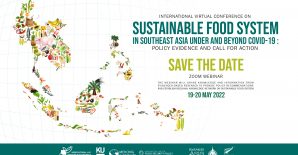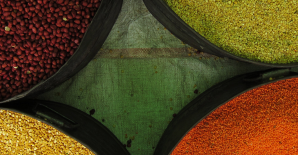News
Uzbekistan to expand crop area of beans
Beans, mung beans, and peas will occupy more than 374,000 hectares of cropland in 2018, or approximately 40 percent of total crop area. Beans have become an important export crop for Uzbekistan: mung bean exports tripled between 2015 and 2016, for instance. This year, Uzbekistan started growing a new type of mung bean for export to India. – AzerNews
JICA continues supporting rural development in Tajikistan's areas bordering Afghanistan
The second phase of the Japan International Cooperation Agency’s (JICA) “Livelihoods Improvement in Tajik-Afghan Cross-Border Areas” (LITACA) project will be implemented over three years and commence on January 2018. The total amount of the project is estimated at approximately $10 million, 40 percent of which will be allocated for projects in Tajikistan focusing on job creation and small business activities. The remaining portion will be directed to Afghanistan. Under the first phase of the project, LITACA assisted with the construction of schools, hydropower plants, and facilities for water supply, sanitation, and irrigation. – Asia-Plus
VAT for flour introduced in Kyrgyzstan
Kyrgyz parliament deputies adopted a bill on the introduction of value added taxes on the import of flour and grain. In 2015, when Kyrgyzstan joined the Eurasian Economic Union, the economic ministry proposed to exempt grain imports from VAT in order to support domestic flour mills. A subsequent amendment also exempted flour, including domestic flour processed from grain imports. An economic ministry deputy reported that this led to losses of more than 1 billion soms (approximately $14.3 million) in tax revenue over two years. – 24.kg
Turkmenistan currency crisis seen causing cola shortage
Prices for Coca-Cola have rapidly increased in Turkmenistan, which a company spokesperson is attributing to a shortage of raw materials and currency conversion issues. Retailers are claiming that Coke, which entered the Turkmen market shortly after independence, is now too expensive to stock. A dual exchange rate, which had been unified in 2008, has reappeared in the past two years, with reports saying that the dollar is now valued at over 8 manats in the black market compared to 3.5 manats at the official rate. – Agence France Presse (via NDTV)
First Baku-Tbilisi-Kars train departs from Turkey's Mersin
The Baku-Tbilisi-Kars (BTK) railway began operations on November 29, with the first train departing from Turkey’s port city Mersin for Azerbaijan. An official from Turkey’s state railroad agency claims that eastbound cargo from Turkey will reach Turkmenistan in 100 hours and Kazakhstan’s capital Astana in 180 hours. – Hurriyet
Analysis & Other Information
EBRD sees important role for its countries in Belt and Road Initiative
EBRD vice president Alain Pilloux believes that EBRD’s focus countries can also benefit from the Chinese “One Belt One Road” initiative. Pilloux spoke at a forum in Georgia, which he believes especially stands to gain because of the country’s strategic decisions and geographic position. – EBRD
Tajikistan keeps selling debt amid macroeconomic wasteland
Tajik finance minister Abdusalom Korboniyon said that Tajikistan plans to sell $850 million in bonds over the next three years. In September, Tajikistan issued a ten-year $500 million bond that was quickly snapped up by international investors looking for higher returns than what was available in more established markets. It is believed that the government wants to finance the Rogun Dam project through these bonds. – The Diplomat
Korea agrees to provide $2.5 billion worth of support to Uzbekistan
South Korea will provide financial support to Uzbekistan, consisting of $2 billion in project financing and $500 million in economic development loans. The agreement was announced at a bilateral summit meeting of the countries’ two presidents. Furthermore, Korea will support Uzbekistan’s entry into the World Trade Organization and assist government agencies in helping Uzbekistan meet WTO criteria. – Korea Herald, AzerNews
Russian economy returns to modest growth in 2017, says World Bank
According to the World Bank’s latest Russia Economic Report, Russia is experiencing greater macroeconomic stability and modest growth. The report also focuses on the Russian agricultural sector, which has increased wheat export capacity and achieved self-sufficiency in poultry and pork. Developments in Russia have strong implications for many Central Asian households and the region’s economies as a whole. – World Bank
Publications & Reports
Features of Tajikistan's past and future climate
J. Aalto, M. Kamarainen, M. Shodmonov, N. Rajabov, A. Venalainen (2017). International Journal of Climatology, 37(14), pp. 4949-4961.
The Dutch disease effect on agricultural value added: evidence from Azerbaijan, Kazakhstan, Kyrgyzstan, and Uzbekistan
M. Destek, I. Okumus, A. Yildirim (2017). Bilig, 83, pp. 225-239.
The land and water nexus in a transition context: the case of Tajikistan
F. Klumper (2017). Martin‐Luther‐Universität Halle‐Wittenberg.
Labour migration, sex, and polygyny: negotiating patriarchy in Tajikistan
H. Thibault (2017). Ethnic and Racial Studies, 2017, pp. 1-18.
Corruption, social norms, and everyday life in Uzbekistan
R. Urinboyev, M. Svensson (2017). Corruption and Norms: Why Informal Rules Matter.
Russia's recovery: how strong are its shoots?
World Bank (2017). Russia Economic Report, Nov. 2017, 38.
Archived issues of the news digest can be found on the Central Asia page under the ReSAKSS Asia website: http://resakss-asia.org/regions/central-asia. A link to the newsletter can be found under Blog Posts.
The articles included in this news digest have been generated from online sources. Any opinions stated herein are not representative of, or endorsed by, the International Food Policy Research Institute or its partners.



